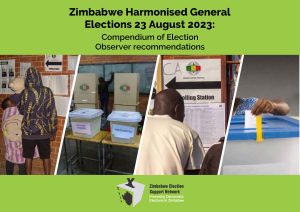The Zimbabwe Election Support Network (ZESN) has been tracking progress by the government in the implementation of electoral reforms premised on recommendations proffered by local, regional and international Election Observer Missions (EOMs) to the 2018 harmonized elections. Notably, parliament passed and the President assented to the Constitutional Amendment Number 2, which extended the women’s quota in the National Assembly for another ten (10) years, introduced a 30 percent women’s quota in local government, and provided for a quota for ten (10) youths in the National Assembly on a party-list basis and five (5) female youths within the current women’s quota.
While Constitutional Amendment Number 2 extended the women’s quota for another 10 years, introduced a 30 percent women’s quota in local government, ZESN is of the view that, notably this amounts to a change, however it is unlikely that gender parity will be attained in the 2023 elections based on this electoral framework. Concerning youth participation, the Amendment now provides for a youth quota system. While the constitutional change guarantees some youthful representatives in the National Assembly, it appears that the number of representatives provided for in the Amendment was not informed by a scientific approach or meaningful consultations with the affected youth. The quota is at odds with population demographics and official voter registration and participation statistics. Further, whereas the Amendment mentioned People with Disabilities (PwDs), it was short on details for implementation. The Zimbabwe Gender Commission adopted a Gender and Inclusion Policy, while it is a positive development, it cannot be enforced as law.
